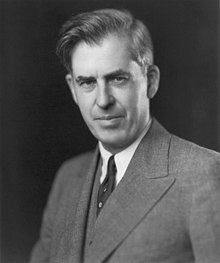H. A. Wallace
| Henry Agard Wallace | |
|---|---|
 |
|
| 33rd Vice President of the United States | |
|
In office January 20, 1941 – January 20, 1945 |
|
| President | Franklin D. Roosevelt |
| Preceded by | John Nance Garner |
| Succeeded by | Harry S. Truman |
| 10th United States Secretary of Commerce | |
|
In office March 2, 1945 – September 20, 1946 |
|
| President | Franklin D. Roosevelt Harry S. Truman |
| Preceded by | Jesse Holman Jones |
| Succeeded by | W. Averell Harriman |
| 11th United States Secretary of Agriculture | |
|
In office March 4, 1933 – September 4, 1940 |
|
| President | Franklin D. Roosevelt |
| Preceded by | Arthur M. Hyde |
| Succeeded by | Claude R. Wickard |
| Personal details | |
| Born |
October 7, 1888 Orient, Iowa, U.S. |
| Died | November 18, 1965 (aged 77) Danbury, Connecticut, U.S. |
| Nationality | American |
| Political party |
|
| Spouse(s) | Ilo Browne (m. 1914; his death 1965) |
| Children |
|
| Alma mater | Iowa State University |
| Signature | |
Henry Agard Wallace (October 7, 1888 – November 18, 1965) was the 33rd Vice President of the United States (1941–1945), the 11th Secretary of Agriculture (1933–1940), and the 10th Secretary of Commerce (1945–1946). He founded the Progressive Party and served as its presidential nominee in the 1948 presidential election. He was a strong supporter of New Deal liberalism and sought conciliation with the Soviet Union.
The son of Secretary of Agriculture Henry Cantwell Wallace, Henry A. Wallace was born in Adair County, Iowa. After earning a degree in animal husbandry from Iowa State University, Wallace worked as a farmer and newspaper editor. He founded the Hi-Bred Corn Company, which experienced immense success and made Wallace wealthy. Wallace also helped introduce the use of statistics and econometrics in agriculture. Starting in the 1920s, he explored various religions, becoming interested in theosophy and befriending figures such as George William Russell and Nicholas Roerich.
In 1933, President Franklin D. Roosevelt appointed Wallace as his Secretary of Agriculture. Though raised a Republican, Wallace joined the Democratic Party in 1936. As Agriculture Secretary, Wallace sought to raise farm prices and supported the ever-normal granary concept. After Roosevelt dumped John Nance Garner from the ticket in 1940, he selected Wallace as his running mate in his bid for an unprecedented third term. The selection of the liberal Wallace upset many Democratic delegates, and Wallace was only nominated by the 1940 Democratic National Convention after Roosevelt threatened to decline the presidential nomination. The ticket of Roosevelt and Wallace defeated the Republican ticket in the 1940 election, and Wallace was sworn in as vice president in 1941. As Wallace remained unpopular with many Democratic leaders, the 1944 Democratic National Convention denied Wallace re-nomination and instead selected Harry S. Truman as Roosevelt's running mate in the 1944 presidential election. Roosevelt appointed Wallace to the position of Secretary of Commerce in March 1945 and Wallace continued to serve under President Truman after Roosevelt died in April 1945.
...
Wikipedia
